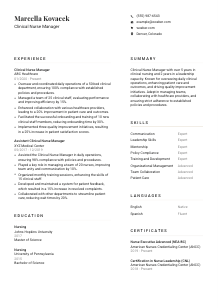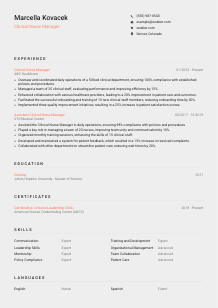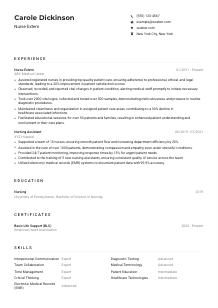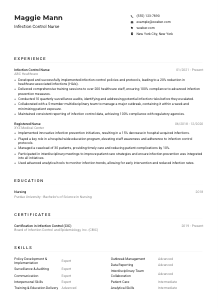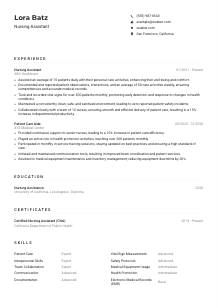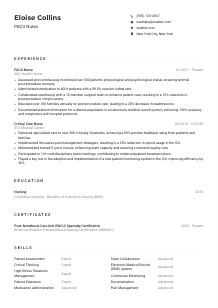Clinical Nurse Manager Resume Example
Leading the ward but feeling lost in paperwork? Navigate to this Clinical Nurse Manager resume example, shaped with Wozber free resume builder. Learn how to harmonize your outstanding patient care with managerial expertise, ensuring your career trajectory is always on the healthiest path!
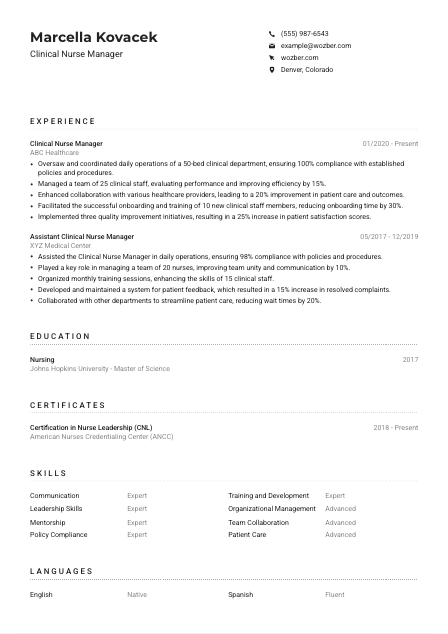
How to write a Clinical Nurse Manager Resume?
Greetings, aspiring Clinical Nurse Manager! In the realm of healthcare, where compassion meets leadership, your resume stands as a bridge to your next great opportunity. Armed with Wozber's free resume builder, this guide is your north star in navigating the nuances of tailoring a resume that resonates strongly with the Clinical Nurse Manager role. Embark on this journey with us to transform your resume into a compelling narrative that not only meets but surpasses job requirements.
Personal Details
The gateway to your professional world, the Personal Details section, though seemingly straightforward, demands careful crafting to set the right tone for your application.
1. Present Your Name Boldly
Think of your name as the headline of your personal brand. Opt for a clear, professional font at a slightly larger size to ensure it captures immediate attention.
2. Match the Job Title
Mirror the job title directly below your name to quickly align your application with the role. For instance, positioning 'Clinical Nurse Manager' prominently aligns you with the sought-after position, creating an instant connection with the hiring manager.
3. Detail Your Communication Pathways
List your phone number and a professional email address built on a simple formula like firstname.lastname@email.com to maintain professionalism. Double-check these details to avoid any unfortunate typos that could cost you an opportunity.
4. Confirm Your Location
Given the requirement of being located in Denver, Colorado, make sure to clearly state your city and state. This assures the hiring manager that you're well within the preferred geographical vicinity, eliminating any concerns regarding relocation.
5. Web Presence
If applicable, include a LinkedIn profile link or a personal website that showcases your professional achievements or portfolio. Ensure these platforms are up-to-date and echo the professionalism of your resume.
Takeaway
Your Personal Details section is the handshake before the interview. It's the first impression that sets the stage, so prioritize clarity, accuracy, and alignment with the Clinical Nurse Manager role. You're not just a candidate; you're the next Clinical Nurse Manager in waiting.





Experience
The Experience section is the cornerstone of your resume, offering a compelling narrative of your professional journey. For a Clinical Nurse Manager, it's about demonstrating leadership, clinical expertise, and operational acumen.
- Oversaw and coordinated daily operations of a 50‑bed clinical department, ensuring 100% compliance with established policies and procedures.
- Managed a team of 25 clinical staff, evaluating performance and improving efficiency by 15%.
- Enhanced collaboration with various healthcare providers, leading to a 20% improvement in patient care and outcomes.
- Facilitated the successful onboarding and training of 10 new clinical staff members, reducing onboarding time by 30%.
- Implemented three quality improvement initiatives, resulting in a 25% increase in patient satisfaction scores.
- Assisted the Clinical Nurse Manager in daily operations, ensuring 98% compliance with policies and procedures.
- Played a key role in managing a team of 20 nurses, improving team unity and communication by 10%.
- Organized monthly training sessions, enhancing the skills of 15 clinical staff.
- Developed and maintained a system for patient feedback, which resulted in a 15% increase in resolved complaints.
- Collaborated with other departments to streamline patient care, reducing wait times by 20%.
1. Break Down the Job's Demands
Start by dissecting the job description. Highlight phrases like 'manage and evaluate the performance of clinical staff' and 'coordinate daily operations.' These clues guide you in tailoring your historical roles to the needs of your future role.
2. Present Your Professional Narrative
List your experiences in reverse chronological order, emphasizing roles and responsibilities that mirror the job description. For each position, include your job title, company name, and period of employment, ensuring a clear, professional layout.
3. Detail Your Achievements
Use bullet points to describe your accomplishments, mirroring the language of the job description. Phrases like 'enhanced collaboration leading to a 20% improvement in patient care,' align directly with the employer's requirements, showcasing your direct impact.
4. Quantify Your Impact
Whenever possible, quantify your achievements. Numbers provide tangible evidence of your contributions. For example, 'implemented quality improvement initiatives resulting in a 25% increase in patient satisfaction scores,' clearly demonstrates your effectiveness.
5. Relevance is Key
While your past as the leading scorer in your club's soccer team might be impressive, keep the focus on professional achievements that resonate with the Clinical Nurse Manager role. Prioritize experiences that showcase leadership, clinical operations, and team management.
Takeaway
Your experience section is your professional story, told in numbers and achievements. Tailor it using the language of your prospective role and let each bullet point echo your readiness and aptitude for the Clinical Nurse Manager position. You have what it takes; now let it shine!
Education
For the Clinical Nurse Manager position, your education section is more than a list of degrees; it's a testament to your foundational knowledge and preparation for leadership in healthcare.
1. Address the Essentials
The job description specifies a Bachelor's degree in Nursing as a minimum requirement, with a Master's degree in Nursing or Healthcare Management preferred. Ensure these qualifications are prominently listed, mirroring the job's educational prerequisites.
2. Structure for Clarity
Keep the layout simple and straightforward: list your degree, the field of study, the institution's name, and the year of graduation. This clear structure makes it easy for the hiring manager to verify your educational background at a glance.
3. Tailor to the Role
Emphasize degrees that directly align with the Clinical Nurse Manager role. For instance, detailing your Master of Science in Nursing and Bachelor of Science in Nursing showcases the depth of your clinical and managerial foundation.
4. Coursework and Certifications
While the primary focus should be on your degrees, complementing them with relevant courses or certifications (like a Certification in Nurse Leadership) can provide an additional layer of relevance and commitment to your professional development.
5. Extra Milestones
Mention any honors or extracurricular activities related to nursing or leadership. This could include honor society memberships, significant academic projects, or leadership roles in student organizations, further demonstrating your passion and dedication.
Takeaway
Your education section is a foundational pillar of your resume, validating your qualification for the Clinical Nurse Manager role. Highlight your educational journey with precision, focusing on degrees and achievements that align with the position's requirements. Show them you're not just qualified - you're dedicated.
Certificates
In a field as dynamic as nursing, certifications not only highlight your expertise but also your commitment to staying abreast of the latest in healthcare leadership and patient care.
1. Key Certifications
Referencing the job description, highlight certifications directly relevant to the Clinical Nurse Manager role. For example, an 'Active Registered Nurse (RN) license' and 'Certification in Nurse Leadership (such as CNML or NEA-BC)' are explicitly valued.
2. Prioritize Relevance
It's more impactful to list a few certifications that directly speak to the core of the Clinical Nurse Manager position rather than an exhaustive list of every certificate you've earned. Quality over quantity ensures the hiring manager sees what's most relevant.
3. Transparency with Dates
Listing the dates of acquisition or expiration of your certificates, especially those with a validity period, adds transparency and shows you're up-to-date with your credentials.
4. Continuous Learning
The ever-evolving nature of healthcare demands continuous learning. Always look for opportunities to update and expand your certifications, especially those that enrich your capabilities as a Clinical Nurse Manager.
Takeaway
Your certifications are badges of honor, signifying your expertise and ongoing commitment to professional excellence. Carefully curated and up-to-date certifications say much about your dedication as a Clinical Nurse Manager. Prioritize relevance and transparency to showcase your best self.
Skills
In the robust role of a Clinical Nurse Manager, your skills section isn't just a list; it's a finely tuned repertoire of your abilities, ready to meet the challenges of leadership and patient care head-on.
1. Decipher the Job's Needs
First, extract explicit and implicit skills from the job description, such as 'strong communication, organizational, and leadership skills.' These will form the foundation of your skills section.
2. Matching Skills
Tailor your skills list to reflect both the hard and soft skills the job description emphasizes. For a Clinical Nurse Manager, prioritizing skills like 'Policy Compliance,' 'Team Collaboration,' and 'Patient Care' directly bridges your capabilities to the role's requirements.
3. Order and Precision
Organize your skills in a manner that maximizes impact; listing your strongest and most relevant skills first captures the hiring manager's attention. A concise, well-organized skills section telegraphs professionalism and a keen understanding of the role's demands.
Takeaway
Your skills section is a declaration of your professional toolkit. By tailoring it to mirror the role's requirements, you signal your readiness and exceptional fit for the Clinical Nurse Manager position. Let each skill be a testament to your capability and dedication.
Languages
In a globally connected healthcare environment, your ability to communicate in multiple languages can be a significant advantage, making this section more than just an add-on.
1. Job Requirements Check
Always start by verifying if the job posting specifies any language prerequisites. In this case, 'The position demands fluency in English,' which should be prominently listed in your resume.
2. Prioritize Essential Languages
List English at the top of your language section, labeling your proficiency level clearly, to directly align with the job requirement. In this scenario, indicating 'Native' or 'Fluent' proficiency in English is crucial.
3. Additional Languages
If you're proficient in other languages, list them as well. Even if not required, additional languages can underscore your communication strengths and cultural adaptability, valuable traits in any leadership role.
4. Honesty in Proficiency
Be truthful about your language proficiency levels. Misrepresentation could lead to uncomfortable situations, especially in a sensitive field like healthcare. Use clear terms like 'Fluent,' 'Intermediate,' and 'Basic' to describe your skill levels.
5. Role Scope Understanding
Consider the broader implications of your linguistic skills. For roles that involve working with diverse patient populations or international collaboration, multilingual abilities could significantly enhance your candidacy.
Takeaway
Your language skills are a bridge to better communication and understanding in a diverse world. Highlighting your linguistic talents, especially those directly relevant to the role, adds a layer of appeal to your application, showcasing your readiness as a global Clinical Nurse Manager.
Summary
Crafting a compelling Summary section is like opening with a strong, confident handshake. It's your chance to distill your professional essence, aligning it closely with the role of Clinical Nurse Manager.
1. Role Reflection
Begin by internalizing the essence of the Clinical Nurse Manager role. Understand the blend of leadership, clinical expertise, and administrative proficiency required to excel.
2. Introduction
Start with an overview statement that introduces you as a professional. Incorporating phrases like 'known for overseeing daily clinical operations' directly ties your experience to the role's key demands.
3. Key Highlights
Mention your most pertinent skills and achievements next. Highlighting accomplishments like 'leading to a 20% improvement in patient care and outcomes' showcases the tangible impact you've made, echoing the responsibilities of a Clinical Nurse Manager.
4. Brevity and Impact
Maintain clarity and conciseness in your summary. By distilling your professional journey into 3-5 impactful lines, you create a memorable introduction that encourages the hiring manager to delve deeper into your resume.
Takeaway
Your summary is your elevator pitch, inviting the hiring manager into your professional world. Tailor it meticulously to reflect your readiness for the Clinical Nurse Manager role, spotlighting your achievements and capabilities. Let it be the compelling opener to your professional story.
Launching Your Clinical Nurse Manager Journey
Congratulations on equipping yourself with the insights to craft a resume that stands out in the competitive field of nursing management. With these tailored tips and Wozber's free resume builder, including ATS-friendly resume templates and an ATS resume scanner, you're ready to bridge your career aspirations with reality. Remember, your resume is your narrative.
Fine-tune it, make it vivid with your unique contributions, and let it pave your way to your next role as a Clinical Nurse Manager. The healthcare world awaits your leadership; step forward with confidence!

- Bachelor's degree in Nursing;
- Master's degree in Nursing or Healthcare Management preferred.
- Minimum of 5 years of clinical nursing experience, with at least 2 years in a leadership or managerial capacity.
- Active Registered Nurse (RN) license in the state of practice.
- Certification in Nurse Leadership (such as CNML or NEA-BC) strongly preferred.
- Strong communication, organizational, and leadership skills.
- The position demands fluency in English.
- Must be located in Denver, Colorado.
- Oversee and coordinate daily operations of the clinical department, ensuring compliance with established policies and procedures.
- Manage and evaluate the performance of clinical staff, providing feedback, mentorship, and support as needed.
- Collaborate with other healthcare providers and departments, ensuring optimal patient care and outcomes.
- Participate in the recruitment, orientation, and training of new clinical staff.
- Develop and implement quality improvement initiatives, ensuring the highest standard of care for patients.





